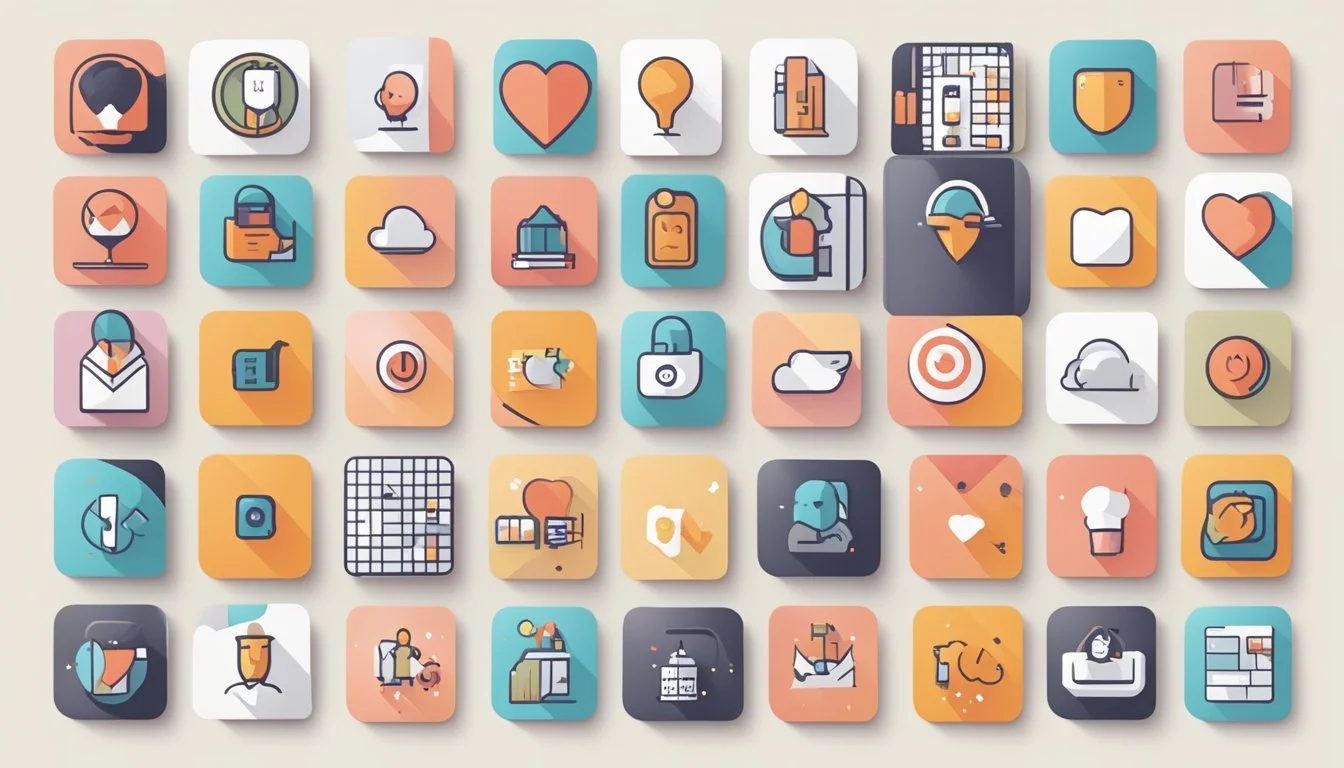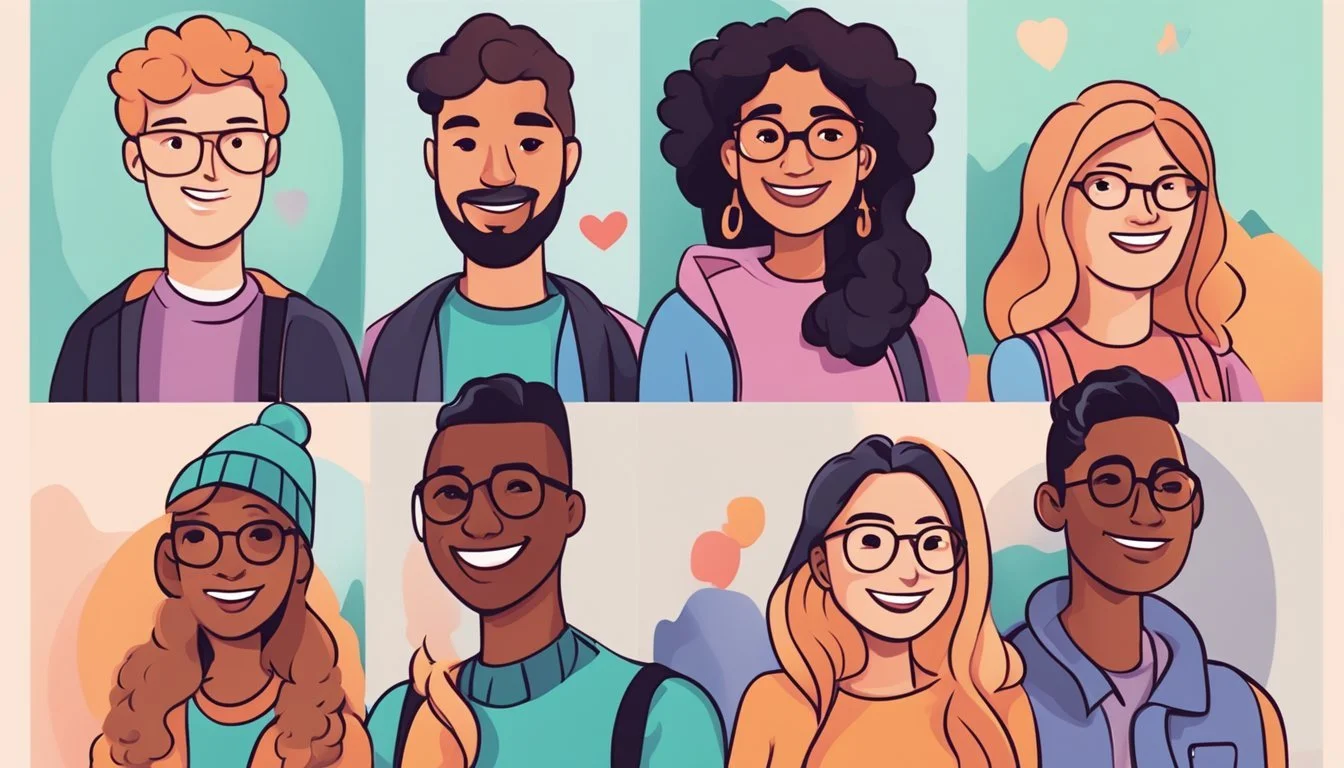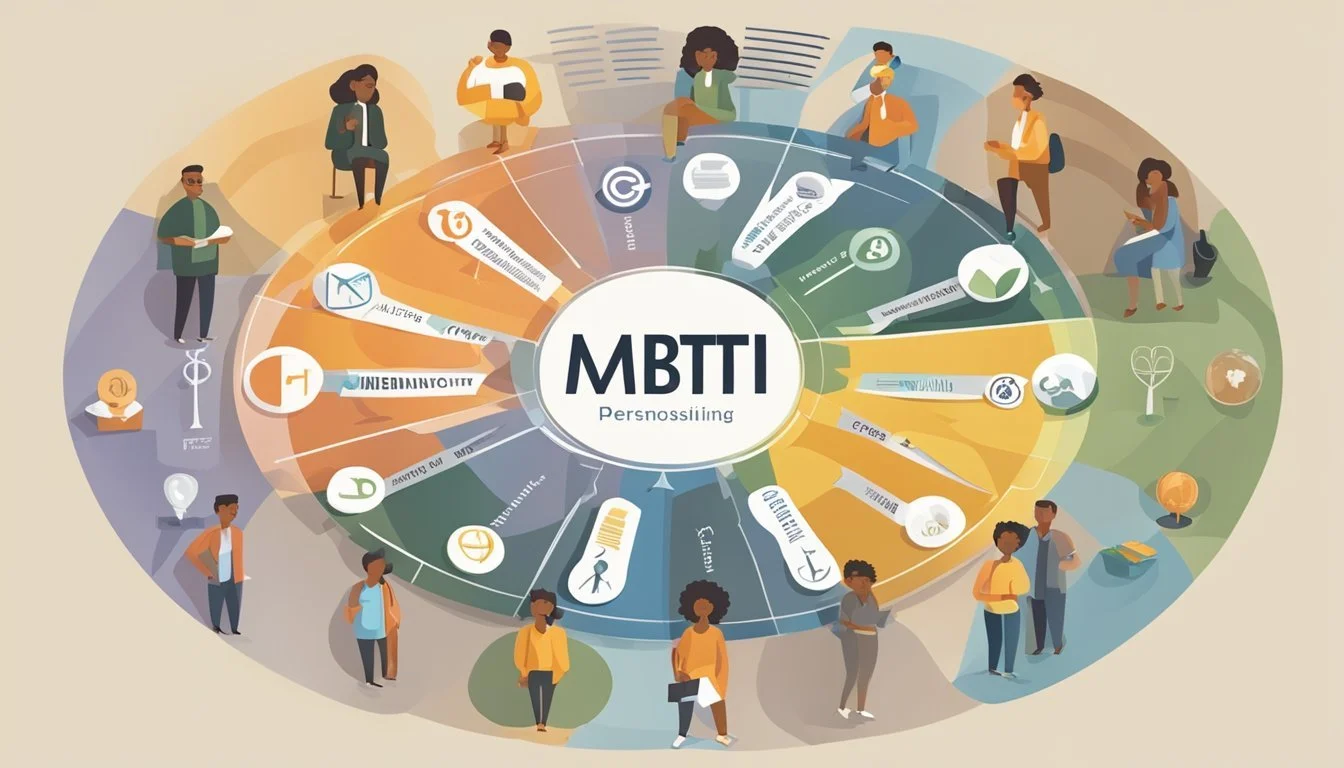Exploring Tinder Personality Types and Compatibility
Tinder's integration of personality types based on the Myers-Briggs Type Indicator (MBTI) has added a new dimension to online dating. These 16 personality categories provide users with a quick snapshot of potential matches' traits and tendencies. The personality types displayed on Tinder profiles are derived from Jungian archetypes and the MBTI model, offering insights into individuals' preferences, communication styles, and decision-making processes.
Each personality type on Tinder is represented by a four-letter code, with each letter signifying a specific trait. For example, INTJ stands for Introverted, Intuitive, Thinking, and Judging. This system allows users to quickly assess compatibility based on shared or complementary characteristics.
Understanding these personality types can enhance the Tinder experience by helping users make more informed decisions about potential matches. It also provides a starting point for conversations and can lead to deeper connections. However, it's important to remember that personality types are just one aspect of a person's complex identity.
Understanding Myers-Briggs Personality Types
The Myers-Briggs Type Indicator (MBTI) categorizes individuals into 16 distinct personality types based on four key dichotomies. These personality types provide insights into how people perceive the world and make decisions.
The Four Dichotomies
The MBTI is built on four core dichotomies:
Extraversion (E) vs. Introversion (I)
Sensing (S) vs. Intuition (N)
Thinking (T) vs. Feeling (F)
Judging (J) vs. Perceiving (P)
Each dichotomy represents a preference in how individuals interact with their environment and process information.
Extraversion and Introversion describe where people focus their attention and energy. Sensing and Intuition relate to how individuals gather information. Thinking and Feeling represent how people make decisions. Judging and Perceiving indicate how individuals approach the outside world.
16 Distinct Personality Types
The combination of preferences across the four dichotomies results in 16 unique personality types. Each type is represented by a four-letter code:
ISTJ - The Inspector
ISFJ - The Protector
INFJ - The Counselor
INTJ - The Mastermind
ISTP - The Craftsman
ISFP - The Composer
INFP - The Healer
INTP - The Architect
ESTP - The Dynamo
ESFP - The Performer
ENFP - The Champion
ENTP - The Visionary
ESTJ - The Supervisor
ESFJ - The Provider
ENFJ - The Teacher
ENTJ - The Commander
These types offer a framework for understanding individual differences in behavior, communication styles, and decision-making processes.
Personality Dynamics: Dominant, Auxiliary, Tertiary, and Inferior Functions
Each Myers-Briggs personality type has a unique cognitive function stack. This stack consists of four functions:
Dominant function: The primary mode of operation
Auxiliary function: Supports and balances the dominant function
Tertiary function: Less developed, emerges in supportive environments
Inferior function: Least developed, often emerges under stress
These functions work together to shape an individual's personality and behavior. The dominant function is the most natural and well-developed. The auxiliary function complements the dominant, providing balance. The tertiary and inferior functions are less developed but can be strengthened over time.
Understanding these dynamics helps individuals recognize their strengths and potential areas for growth.
Personality Types and Online Dating
Personality types play a crucial role in shaping online dating experiences. Understanding how different traits influence behavior on platforms like Tinder can lead to more successful matches and interactions.
Creating a Tinder Profile Aligned with Your MBTI
Crafting a Tinder profile that reflects your personality type can attract compatible matches. Extroverts may showcase their social nature with group photos and adventurous activities. Introverts might highlight their thoughtful side with book recommendations or creative pursuits.
Sensing types often include practical details about their interests and lifestyle. Intuitive individuals may focus on abstract concepts or future aspirations. Thinking types tend to present logical, objective information. Feeling types often emphasize emotional connections and personal values.
Judging personalities typically create structured, organized profiles. Perceiving types may opt for a more flexible, spontaneous approach. Tailoring your profile to your MBTI can help potential matches better understand your preferences and communication style.
Messaging and Communication Styles
Different personality types approach messaging on Tinder in distinct ways. Extroverts often initiate conversations readily and engage in rapid-fire exchanges. Introverts may take more time to respond, preferring thoughtful, in-depth discussions.
Sensing types tend to focus on concrete topics and shared experiences. Intuitive individuals often enjoy exploring abstract ideas and potential future scenarios. Thinking types may prioritize intellectual conversations and logical problem-solving. Feeling types frequently emphasize emotional connections and shared values.
Judging personalities often appreciate clear communication and defined expectations. Perceiving types may prefer a more open-ended, flexible approach to messaging. Understanding these differences can help users navigate conversations more effectively.
Assessing Compatibility and Potential Matches
Evaluating compatibility based on personality types can improve match quality on Tinder. Similar types often share communication styles and values, potentially leading to smoother interactions. Complementary types may balance each other's strengths and weaknesses.
Extrovert-introvert pairings can work well, with each partner bringing different energies to the relationship. Sensing-intuitive matches may benefit from diverse perspectives on life. Thinking-feeling combinations can balance logic and emotion in decision-making.
Asking personal questions related to MBTI traits can reveal shared values and long-term compatibility. Discussing future goals, communication preferences, and relationship expectations early on can help assess potential for serious commitment.
Personality Types in Action on Tinder
Personality types play a significant role in shaping interactions and connections on Tinder. Users can leverage this knowledge to navigate the app more effectively and find compatible matches.
Identifying Personality Type Through Profiles and Interactions
Tinder profiles often reveal clues about a person's personality type. Extroverts may have vibrant photos showcasing social activities, while introverts might display more subdued images. Sensing types tend to focus on concrete details in their bios, whereas intuitive types may use abstract language or metaphors.
When messaging, thinking types often engage in logical discussions, while feeling types express emotions more readily. Judging personalities might propose specific plans quickly, and perceiving types may prefer keeping options open.
Pay attention to conversation styles and profile content to gauge potential compatibility based on personality traits.
The Significance of Authenticity and Genuine Connections
Authenticity is crucial when representing personality types on Tinder. Users who accurately portray their true selves are more likely to form genuine connections. Misrepresenting one's personality type can lead to mismatched expectations and disappointing interactions.
Genuine connections often occur when users embrace their authentic traits rather than trying to fit a perceived ideal. For example, introverts shouldn't feel pressured to appear more extroverted in their profiles or conversations.
Honest representation allows for more meaningful matches based on true compatibility rather than superficial impressions.
Strategies for Successful Swiping Based on Type Preferences
Tailoring swiping strategies to personality type preferences can enhance the Tinder experience. Users seeking similar types might focus on profiles that display compatible traits. For instance, an ENFP looking for shared enthusiasm might swipe right on profiles showcasing creative pursuits or travel adventures.
Conversely, those interested in complementary personalities can look for profiles exhibiting different strengths. An ISTJ might be drawn to more spontaneous types to balance their structured approach.
Consider creating a checklist of desired traits aligned with preferred personality types to guide swiping decisions. This approach can help users focus on potentially compatible matches and save time.
Navigating Relationships Based on MBTI
MBTI personality types offer valuable insights into how individuals interact and form connections in relationships. Understanding these dynamics can lead to more fulfilling partnerships and improved communication.
Relationship Dynamics Between Different MBTI Types
Some MBTI types naturally complement each other, while others may face more challenges. For example, extroverted types often pair well with introverted partners, balancing each other's energy levels. Intuitive types tend to connect deeply with other intuitives, sharing abstract thoughts and ideas.
Sensing types might find common ground in practical matters and day-to-day experiences. Thinking and feeling types can learn from each other's decision-making processes, though they may need to work on understanding different emotional approaches.
Judging and perceiving types can help each other find balance between structure and flexibility in their shared lives.
The Role of MBTI in Understanding Relationship Needs and Growth
MBTI can illuminate individual needs within relationships. Introverts may require more alone time to recharge, while extroverts thrive on social interaction. Recognizing these differences helps partners support each other's well-being.
Sensing types often appreciate concrete expressions of love, while intuitives may value deep, meaningful conversations. Understanding these preferences can guide partners in showing affection effectively.
MBTI also highlights areas for personal growth. A thinking type might work on developing emotional intelligence, while a feeling type could practice more logical decision-making. This mutual growth strengthens the relationship bond.
MBTI and its Influence on Communication and Conflict in Relationships
Communication styles vary significantly between MBTI types. Sensing types tend to focus on facts and details, while intuitives prefer discussing concepts and possibilities. Recognizing these differences can prevent misunderstandings and foster clearer dialogue.
In conflict resolution, thinking types may approach issues logically, while feeling types prioritize emotional harmony. Understanding these contrasting approaches helps partners navigate disagreements more effectively.
Judging types might prefer to address conflicts immediately, seeking closure. Perceiving types may need more time to process before discussing issues. Respecting these preferences can lead to more productive conflict resolution and stronger relationships.
MBTI Types: Strengths and Pitfalls on Tinder
The Myers-Briggs Type Indicator (MBTI) offers insights into how different personality types approach online dating. Each type brings unique strengths and faces distinct challenges when using Tinder.
Overview of Each MBTI Type's Approach to Tinder Dating
Extroverted Types (E):
ENFP: Enthusiastic and creative, they engage matches with witty banter.
ENTP: Enjoy intellectual conversations and seek mentally stimulating connections.
ESFJ: Warm and sociable, they excel at making others feel comfortable.
ESTJ: Direct and organized, they prefer clear communication and defined goals.
Introverted Types (I):
INTJ: Analytical and strategic, they carefully select potential matches.
INFP: Idealistic and empathetic, they seek deep, meaningful connections.
ISTJ: Reliable and practical, they value consistency in communication.
ISFP: Artistic and spontaneous, they appreciate genuine and unique profiles.
Potential Challenges for Each MBTI Type when Dating Online
NF Personalities:
INFJ: May struggle with small talk and feel overwhelmed by too many options.
ENFJ: Might come across as too intense or invested too quickly.
NT Personalities:
INTP: Can appear aloof or disinterested due to their analytical nature.
ENTJ: May be perceived as overly dominant or controlling in conversations.
SJ Types:
ISFJ: Might have difficulty asserting their needs and boundaries.
ESTJ: Can seem inflexible or judgmental if expectations aren't met.
SP Types:
ESTP: May lose interest quickly if not constantly stimulated.
ISTP: Might struggle with expressing emotions or maintaining regular contact.
Beyond MBTI: Other Considerations for Tinder Success
While personality types offer valuable insights, other factors play crucial roles in Tinder success. Photos, bios, and a balanced approach to self-presentation can significantly impact match rates and interactions.
The Importance of Photos and Bio Beyond Personality Typing
High-quality, diverse photos are essential on Tinder. Users should include a clear headshot, full-body image, and pictures showcasing hobbies or interests. This variety gives potential matches a comprehensive view of one's lifestyle and appearance.
Crafting an engaging bio is equally important. A well-written bio should be concise yet informative, highlighting unique traits and interests. It's an opportunity to showcase personality beyond the MBTI type listed.
Humor, when used appropriately, can make profiles more appealing. However, it's crucial to strike a balance and avoid overly complex jokes that might not translate well in text form.
Balancing Personal Insights with a Business-Like Attitude on Dating Apps
Approaching Tinder with a business-like attitude can lead to more successful outcomes. This means being clear about intentions, responsive in communication, and respectful of others' time and preferences.
Setting realistic expectations is key. Not every match will lead to a meaningful connection, and that's okay. Maintaining professionalism in interactions can help navigate potential disappointments or mismatches.
It's important to be authentic while also presenting the best version of oneself. This balance helps create genuine connections while maximizing chances of success on the app.
Keeping a Healthy Perspective: Avoiding MBTI Stereotyping
While MBTI types can provide useful insights, it's crucial to avoid stereotyping. Each individual is unique, and personality types are just one aspect of a person's complex identity.
Approaching matches with an open mind allows for genuine connections beyond type compatibility. It's beneficial to use MBTI as a conversation starter rather than a definitive measure of compatibility.
Remember that people are multifaceted. Jungian archetypes and MBTI types can offer valuable insights, but they shouldn't be the sole basis for judgments or decisions in dating app interactions.





